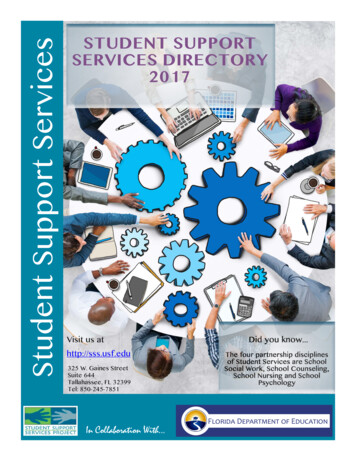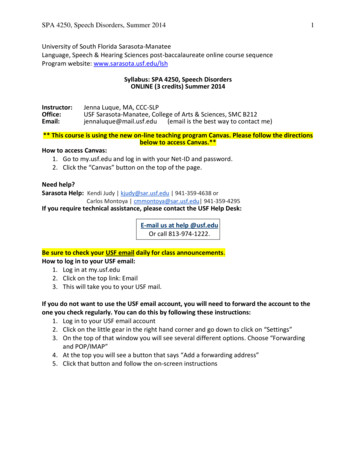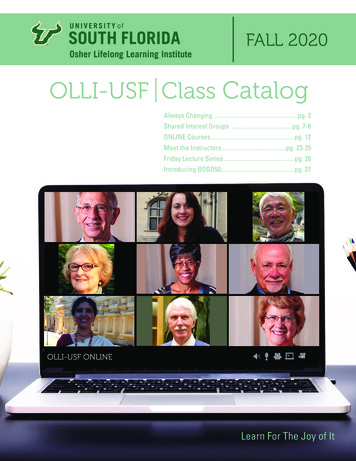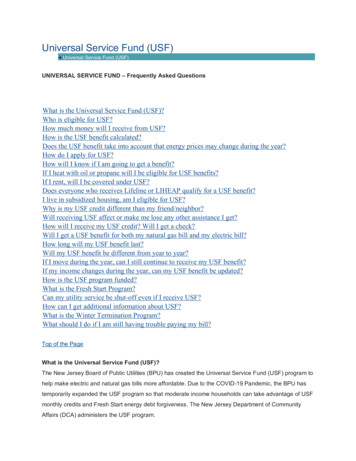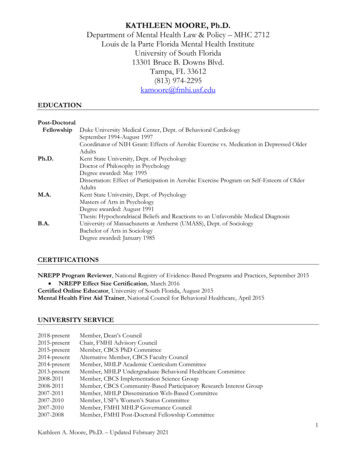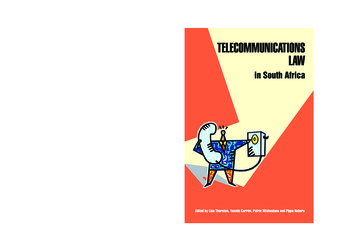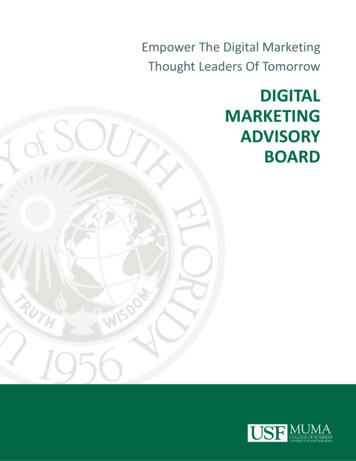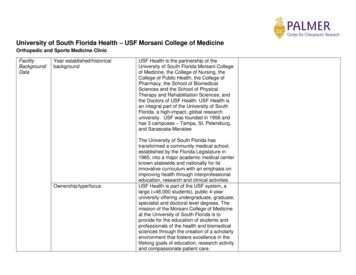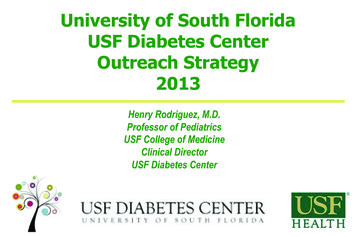
Transcription
Leadership in EngineeringFall 2022Course Numbers:ECH 4931, ECH 6931, EEL 4937, EGN 4930, EML 4930,EIN 4933, EIN 6934, CGN 6933, BME 4931, BME 6931,Course Credit:3 credit hoursInstructor:Tom Krisa (tkrisa@usf.edu)Days, Time &LocationSection 801 TR 8:30 am – 10:30 am, ENB 109Section 802 TR 11:30 am – 1:30 pm, ENB 109Office Hours:Times can be arranged by appointment. In some cases, these willbe held via teleconference.Enrolment Criteria: Enrollment will be restricted within the following boundaries: Have a declared major and be enrolled in anengineering discipline department in the College ofEngineering Have a 2.8 GPA or higherIf classes are over-subscribed, student selection will considerdistribution of disciplines within the class and recommendationsfrom the departments.Texts:There will be assigned readings from handout materials and fromthe following books: Patton on Leadership by Alan Axelrod, ISBN: 9780735202979 The Leadership Challenge (sixth edition) by James Kouzes &Barry Posner, ISBN: 9781119278962, available as a Free ail.action?docID 4836524 The Contrarian’s Guide to Leadership by Steven B. Sample,ISBN: 9780787967079Texts are used in the first week of classes and can be obtained fromthe USF Bookstore at a relatively inexpensive price.Attendance:Participation and attendance at all sessions is required.Absences will have a detrimental impact on other students.
Grading:The class is graded on a Satisfactory/Unsatisfactory basis.The instructor will judge grades based upon the followingcriteria: Attendance (including being late)Full participation and effort in class exercises andactivities Reading and exercise preparation for class exercisesand activities (Please note that there will be exercisepreparations and submission requirements of thatpreparation work the last week of classes.) Submission of required documentation of class work For students enrolled in a graduate-level section:Completion of the special project for graduate students.(Misrepresentation of reasons for absence will be grounds foran Unsatisfactory grade)Class Method:In general, classes will consist of discussions exploring the texts andin-class exercises for exploring and practicing leadership andteamwork concepts and competencies. Live feedback and guidanceare provided by the instructor, TA and peers. Between classes,students have reading assignments, do preparatory work for in-classexercises, and document in-class meetings. Concepts and methodsused in exercises are introduced in short presentations during classor in guidance notes provided as part of the assigned reading. Thereading and instructions for exercise preparation for the followingclass session are generally issued at the end of each class period.Course Objectives: Increase awareness of leadership and teamwork competenciesand strengthen ability to apply that knowledge. The focus will beawareness and application of these competencies and conceptsin a business environment. Competencies that will be practiceddirectly include: Presentations and communications (to team, peers,management, etc.)o Visioningo Motivatingo Convincing/Influencingo Communicating informationo ChallengingFacilitation of meetings/group discussionsChallenging & debatingReading critically (and openly)Listening critically (and openly)Providing feedback constructivelyCoaching
Through the exercises, the class will explore many of the followingtopics: Understanding self and othersPersonal valuesOrganization culture and valuesDecision-makingHandling conflictInnovatingApplying valuesAnalyzing organizational dynamicsRewarding & celebratingDelivering PraiseSetting team directionUsing metricsLeading changePersonal growth & continual developmentFacing difficult questionsImproving business processesCourse Content: First 5 weeks:o Focus on team formationo Between classes students will have readings, preparation for in-classexercises, and some documentation of in-class exercises. The textreadings will be from “Patton on Leadership” and “The Contrarian’s Guideto Leadership.”o Classes are a mix of discussion about the reading, discussion of newconcepts, and in-class exercises.o Students will work with culture models, business process models, coachingmethods, facilitating meetings, performance metrics, and presenting ideas Weeks 6 -11o Focus on giving a team directiono Between classes students will have readings, preparation for in-classexercises, and some documentation of in-class exercises. The textreadings will be from “The Leadership Challenge” and “The Contrarian’sGuide to Leadership.”o Classes are a mix of discussion about the reading, discussion of newconcepts, and in-class exercises.o Students will work with behavioral interviewing, building trust, setting andconveying direction, implementing change, addressing problematicrelationships, and causal loops.
Weeks 12 -16o Focus on managing team businesso Between classes students will have readings, preparation for in-classexercises, and some documentation of in-class exercises. The textreadings will be from “The Contrarian’s Guide to Leadership.”o Classes are a mix of discussion about the reading, discussion of newconcepts, and in-class exercises.o Students will work with decision-making, values in decision-making, andperformance appraisalsSpecial Topics: Personality types: Students will explore different personality types throughclass lecture and exercise. Culture models: Students will be introduced to how to model a team culturevia class lecture and an in-class practical exercise.Causal loop analysis: Students will be introduced to causal loop analysis forassessing organization systems through lecture and in-class exercises.Coaching: Students will be exposed to a model for coaching others through alecture and multiple in-class exercises.Competency interviewing: Students will learn the basics of behavioralcompetency interviewing through class lecture and an in-class exercise.Business process improvement: Students will practice improving businessprocesses by working with a process modelDecision-making: Students will be introduced to a variety of decision-makingtechniques and practice them within in-class exercises.Dealing with career realities: Students will participate in cafédiscussions with industry representatives.Graduate Students: Graduate students will be assigned a special project afterdiscussion with the instructor. The project will generally be agreed approximatelyone month into the semester.Special Notice: All students must comply with university policies and posted signsregarding COVID-19 mitigation measures currently in effect. Failure to do so mayresult in dismissal from class, referral to the Student Conduct Office, and possibleremoval from campus.Additional details are available on the University’s Core Syllabus Policy Statementspage: policy-statements.aspx.
USF Core Syllabus Policy StatementsAcademic Integrity: Academic integrity is the foundation of the University of South FloridaSystem’s commitment to the academic honesty and personal integrity of its universitycommunity. Academic integrity is grounded in certain fundamental values, which includehonesty, respect, and fairness. Broadly defined, academic honesty is the completion of allacademic endeavors and claims of scholarly knowledge as representative of one’s ownefforts. The final decision on an academic integrity violation and related academic sanctionat any USF System institution shall affect and be applied to the academic status of thestudent throughout the USF System, unless otherwise determined by the independentlyaccredited institution. The process for faculty reporting of academic misconduct, as well asthe student’s options for appeal, are outlined in detail in USF System Regulation 3.027.Disruption to Academic Progress: Disruptive students in the academic setting hinder theeducational process. Disruption of the academic process is defined as the act, words, orgeneral conduct of a student in a classroom or other academic environment which in thereasonable estimation of the instructor: (a) directs attention away from the academicmatters at hand, such as noisy distractions, persistent, disrespectful or abusive interruptionof lecture, exam, academic discussion, or general University operations, or (b) presents adanger to the health, safety, or well-being of self or other persons.Academic Grievance Procedure: The purpose of these procedures is to provide allundergraduate and graduate students taking courses within the University of South FloridaSystem an opportunity for objective review of facts and events pertinent to the cause ofthe academic grievance. An “academic grievance” is a claim that a specific academicdecision or action that affects that student’s academic record or status has violatedpublished policies and procedures, or has been applied to the grievant in a mannerdifferent from that used for other students.Disability Access: Students with disabilities are responsible for registering with Studentswith Disabilities Services (SDS) (SVC 1133) in order to receive academic accommodations.SDS encourages students to notify instructors of accommodation needs at least five (5)business days prior to needing the accommodation. A letter from SDS must accompany thisrequest.Sexual Misconduct / Sexual Harassment: USF is committed to providing an environmentfree from sex discrimination, including sexual harassment and sexual violence (USF SystemPolicy 0-004). The USF Center for Victim is a confidential resource where you can talk aboutincidents of sexual harassment and gender-based crimes including sexual assault, stalking,and domestic/relationship violence. This confidential resource can help you without havingto report your situation to either the Office of Student Rights and Responsibilities (OSSR) orthe Office of Diversity, Inclusion, and Equal Opportunity (DIEO), unless you request thatthey make a report. Please be aware that in compliance with Title IX and under the USFSystem Policy, educators must report incidents of sexual harassment and gender-based
crimes including sexual assault, stalking, and domestic/relationship violence. If you discloseany of these situations in class, in papers, or to me personally, I am required to report it toOSSR or DIEO for investigation. Contact the USF Center for Victim Advocacy and ViolencePrevention: (813) 974-5757.Religious Observances: All students have a right to expect that the University willreasonably accommodate their religious observances, practices and beliefs (USF SystemPolicy 10-045). The USF System, through its faculty, will make every attempt to schedulerequired classes and examinations in view of customarily observed religious holidays ofthose religious groups or communities comprising the USF System’s constituency. Studentsare expected to attend classes and take examinations as determined by the USF System. Nostudent shall be compelled to attend class or sit for an examination at a day or timeprohibited by his or her religious belief. However, students should review the courserequirements and meeting days and times to avoid foreseeable conflicts, as excessiveabsences in a given term may prevent a student from completing the academicrequirements of a specific course. Students are expected to notify their instructors at thebeginning of each academic term if they intend to be absent for a class or announcedexamination, in accordance with this Policy.Statement of Academic Continuity: In the event of an emergency, it may be necessary forUSF to suspend normal operations. During this time, USF may opt to continue delivery ofinstruction through methods that include, but are not limited to: Learning ManagementSystem, online conferencing, email messaging, and/or an alternate schedule. It is theresponsibility of the student to monitor the Learning Management System for each classfor course-specific communication, and the main USF, College, and Department websites,emails, and MoBull messages for important general information (USF System Policy 6-010).For additional guidance on emergency protective actions and hazards that affect theUniversity, please visit www.usf.edu/em
Contact the USF Center for Victim Advocacy and Violence Prevention: (813) 974-5757. Religious Observances: All students have a right to expect that the University will reasonably accommodate their religious observances, practices and beliefs (USF System Policy 10-045). The USF System, through its faculty, will make every attempt to schedule
